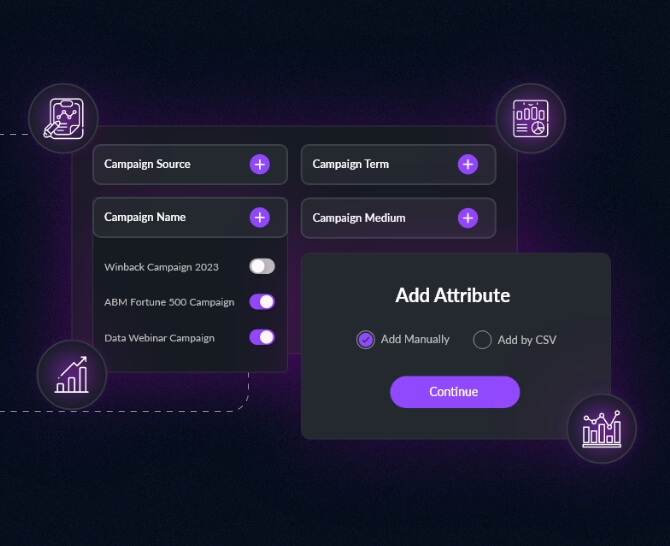
How to Choose the Right Metrics to Track and Measure Your Marketing Effectiveness
Marketing metrics are quantitative values that provide insights into the effectiveness of marketing campaigns, initiatives, and strategies. In this blog post, we have touched base on how you can choose just the right ones to track and measure.
Marketing metrics are crucial indicators that help businesses measure and track the success of their marketing strategies. Understanding the right metrics to track is critical to making informed decisions that drive business growth and long-term success.
Marketing metrics are quantitative values that provide insights into the effectiveness of marketing campaigns, initiatives, and strategies. These metrics help marketers evaluate the impact of their marketing efforts and understand how they can improve their strategies to achieve their marketing and business goals.
If a business does not identify the right metrics to track and measure, it’s possible they may be spending more time and money on initiatives that may not be driving real results. Therefore, choosing the right marketing metrics is important because it helps businesses make data-driven decisions about where to allocate their marketing budget and resources.
In this blog post, we will explore how you can choose the right metrics to track and measure your marketing effectiveness.
Understanding Your Business Objectives
You may have several metrics at your disposal but it’s important to identify what really matters to your business and why you are tracking and measuring these metrics in the first place. The truth of the matter is that marketing metrics are unique to every business and the stakeholders managing the marketing initiatives. Here is how you can effectively determine your business objectives:
Pro Tip- To measure the effectiveness of your marketing efforts, identify the KPI metrics that are directly linked to your goal. It will help you prioritize impactful metrics while balancing leading and lagging indicators.
Step 1: Setting Clear Business Goals
To choose the right marketing metrics, it’s essential to have clear business goals in place. This includes identifying what the business wants to achieve and what it considers to be a successful outcome. For example, a business may have a goal to increase sales by 10% in a given quarter. In this case, tracking vanity metrics such as likes on a particular social media post will just not cut it. So, choose metrics that are directly related to your desired outcome. And while you’re at it, outline a ‘how to’ strategy to pursue those goals.
Step 2: Aligning Marketing Metrics with Business Goals
Once the business goals are clear, the next step is to align the marketing metrics with these goals. This means identifying which metrics will help the business measure its progress towards its objectives. For example, if the goal is to increase revenue, then metrics such as deals closed, customer churn rate, lifetime value, customer acquisition cost, conversion rate, etc, will be relevant.
Step 3: Understanding the Customer Journey
The customer journey refers to the series of interactions and experiences that a customer has with a business, from the initial awareness stage to post-purchase evaluation. Understanding this journey helps businesses identify the right metrics to track at each stage. For example, awareness metrics may be relevant in the early stages of the customer journey, while conversion metrics may be more relevant in later stages of the marketing funnel.
Common Categories of Marketing Metrics to Look At
While there are many metrics that you can track, the idea should always be to measure your marketing effectiveness across channels leveraging a variety of different dimensions – right from your brand value to your overall revenue.
- Awareness Metrics
- Engagement Metrics
- Conversion Metrics
- Retention Metrics
- ROI Metrics
Awareness metrics measure how marketing efforts are increasing brand recognition and awareness. These metrics may include reach, impressions, and social media followers.
Engagement metrics measure how well a business is engaging with its audience. These metrics may include likes, shares, comments, and click-through rates.
Conversion metrics measure the effectiveness of marketing campaigns in driving desired actions, such as purchases or sign-ups. These metrics may include conversion rate, average order value, and cost per acquisition.
Retention metrics measure how well a business is retaining its customers over time. These metrics may include customer lifetime value (CLV), customer retention rate (CRR), and repeat purchase rate (RPR).
ROI metrics measure the return on investment of marketing initiatives. These metrics may include return on ad spend, cost per lead (CPL), cost per acquisition (CPA), and average order value (AOV).
Key Takeaways
- Marketing KPI metrics are essential to track your business’s marketing performance.
- Identifying adequate and relevant KPI metrics will help you achieve the desired objectives.
- ROI, Retention, Conversion, Engagement, and Awareness are some of the most potent KPI metrics.
Choosing the Right Marketing Metrics for Your Business
Now that we’ve established the common types that marketing metrics can be categorized into and why they are crucial to your business success, let’s touch base on what you can do to ensure that you choose the right ones.
- Prioritize Metrics Based on Importance
- Consider the Data Availability
- Make Data-Driven Decisions
- Evaluate Metrics Regularly
It’s not possible to track every marketing metric, so it’s essential to prioritize the most important ones. To do this, consider which metrics are most relevant to the business goals and which metrics will provide the most valuable insights.
Before choosing marketing metrics, consider the availability of data. For example, if a business has limited data on customer behavior post the point of sale, it may not be possible to track retention metrics effectively. In such cases, it may be more feasible to focus on metrics such as conversion rate or cost per acquisition.
While analytics provides extensive data that influences marketing decisions, it is almost never enough. So, look at critical areas that you can gather and analyze data from so as to have a positive impact on your marketing mix – product, placement, pricing, and promotion. Analyze your sales and customer data – churn rate, sales growth, net revenue, annual recurring revenue, retention rate, and average profit margin. This will tell you how and why your product/services are selling. With this, you will be in a position to identify bottlenecks, improve sales forecasting, and ultimately, build better customer relationships.
It’s just as important to figure out when and how often you should check on your marketing metrics as it is to figure out which ones to track. Metrics like visits, number of leads, and leads & visits per channel should be monitored daily. Metrics like campaign, CTA click-through rate, inbound links, and overall blog views should be monitored weekly. Metrics like campaign-based search engine rank, average email click-through rate, and social media metrics should be evaluated monthly. And towards the end of the sales cycle is when you evaluate metrics like lead-to-customer conversion rate and revenue generated by all your marketing activities. Over time as you grow and scale, your business goals and marketing strategies may change, and it may be necessary to adjust the metrics that you are tracking. So, don’t fret while taking that call.
Best Practices for Tracking and Measuring Marketing Metrics
- Use Automated Tools
- Standardize Data Collection and Reporting
- Collaborate with Other Teams
- Provide Context to the Data
Automated tools can be extremely helpful in tracking and measuring marketing metrics. These tools can help businesses collect, store, and analyze data, reducing the time and effort required to track metrics manually.
Standardizing data integration and reporting helps ensure that metrics are being tracked consistently over time. This makes it easier to compare results and identify trends, which can positively influence future marketing strategies.
Marketing metrics often impact other teams within a business, so it’s important to collaborate with other departments when tracking metrics. This can help ensure that metrics are being tracked in a way that is relevant and valuable to all departments and the overall business.
Finally, it’s important to provide context to the data being tracked. This means explaining what the data means and how it relates to the overall business goals. Providing context helps ensure that metrics are being interpreted correctly and provides valuable insights into the business’s marketing efforts.
Importance of Measuring Marketing Effectiveness
Measuring marketing effectiveness is crucial for businesses to ensure that their marketing efforts are yielding the desired results. By analyzing various metrics, businesses can identify successful strategies and areas for improvement.
One of the key benefits of measuring marketing effectiveness is the ability to track the impact on sales, revenue, and overall business success. By tracking metrics such as conversion rates, customer acquisition costs, and return on investment (ROI), businesses can determine the effectiveness of their marketing campaigns. This data-driven approach allows businesses to allocate resources more efficiently and make informed decisions to drive growth.
Successful businesses that prioritize measuring marketing effectiveness have demonstrated significant improvements in their overall performance. By continuously monitoring and analyzing metrics, these businesses are able to adapt their marketing strategies to changing market conditions and consumer behaviors. This allows them to stay ahead of the competition and maximize their marketing investments.
Key Marketing Effectiveness Metrics
- Return on Investment
- Customer Acquisition Cost (CAC)
- Customer Lifetime Value (CLTV)
- Market Share
- Brand Awareness
- Customer Satisfaction
- Conversion Rate
- Cost per Acquisition (CPA)
- Click-through Rate (CTR)
- Social Media Engagement
- Email Open Rate
- Lead Generation
- Sales Revenue
- Churn Rate
- Ad Impressions
- Cost per Click (CPC)
- Average Order Value (AOV)
- Customer Retention Rate
- Net Promoter Score (NPS)
- Marketing Qualified Leads (MQLs)
– Definition and calculation of ROI
– How ROI can measure the effectiveness of marketing campaigns and activities
– Examples of using ROI to evaluate marketing effectiveness
– Understanding CAC and its significance in measuring marketing effectiveness
– Calculation of CAC and its relationship with customer value and revenue
– How to analyze CAC to optimize marketing strategies
– Definition of CLTV and its role in evaluating marketing effectiveness
– How CLTV can help measure the long-term impact of marketing efforts
– Strategies for improving CLTV through effective marketing campaigns
– Importance of market share as an indicator of marketing effectiveness
– How to measure and analyze market share in relation to competitors
– Using market share data to assess the effectiveness of marketing campaigns
– Definition and significance of brand awareness in marketing effectiveness
– Methods for measuring brand awareness, including surveys and social media analytics
– The relationship between brand awareness and business growth
– The role of customer satisfaction as a metric for evaluating marketing effectiveness
– Tools and techniques for collecting and analyzing customer satisfaction data
– Strategies for improving customer satisfaction through marketing efforts
– Definition and calculation of conversion rate
– How conversion rate reflects the effectiveness of marketing campaigns
– Strategies for maximizing conversion rates and improving marketing effectiveness
– Understanding CPA and its importance in measuring marketing effectiveness
– Calculation of CPA and its relationship with customer acquisition and revenue
– How to optimize marketing strategies based on CPA analysis
– Definition and calculation of CTR
– How CTR can indicate the effectiveness of marketing campaigns and advertisements
– Techniques for improving CTR and optimizing marketing efforts
– Significance of social media engagement in measuring marketing effectiveness
– Methods for tracking and analyzing social media engagement metrics
– Strategies for increasing social media engagement and enhancing marketing effectiveness
– Importance of email open rate as a metric for evaluating marketing effectiveness
– Measures to improve email open rates and optimize email marketing campaigns
– How email open rate impacts overall marketing success
– Definition of lead generation and its relevance to marketing effectiveness
– Effective lead generation strategies and tactics
– How to measure the success of lead generation efforts and assess marketing effectiveness
– The role of sales revenue as a key indicator of marketing effectiveness
– How to track and evaluate the impact of marketing on sales revenue
– Strategies for increasing sales revenue through effective marketing campaigns
– Understanding churn rate and its implications for marketing effectiveness
– Calculation of churn rate and its relationship with customer retention
– Strategies for reducing churn rate and improving marketing effectiveness
– Significance of ad impressions as a metric for assessing marketing effectiveness
– How to measure and analyze ad impressions to evaluate campaign reach
– Strategies for optimizing ad impressions and improving marketing effectiveness
– Definition of CPC and its importance in measuring marketing effectiveness
– Calculation of CPC and its relationship with campaign performance and ROI
– Techniques for optimizing CPC and enhancing marketing effectiveness
– The role of AOV as a metric for evaluating marketing effectiveness and customer spend
– How AOV can reflect the success of marketing strategies in increasing purchase value
– Strategies for improving AOV and maximizing marketing effectiveness
– Significance of customer retention rate in assessing marketing effectiveness
– Calculation of customer retention rate and its impact on business revenue
– Strategies for improving customer retention through effective marketing efforts
– Understanding NPS and its relevance to measuring marketing effectiveness
– Calculation of NPS and its relationship with customer satisfaction and loyalty
– How to utilize NPS data to improve marketing strategies and effectiveness
– Definition of MQLs and their significance in evaluating marketing effectiveness
– Methods for identifying and tracking MQLs within marketing campaigns
– Strategies for optimizing MQLs and improving overall marketing effectiveness
Conclusion
Now that you know and understand that while there are many metrics that you can track, not every metric can be given the same weight and the impact of each of your chosen metrics depends on your business goals and priorities. So, choose wisely!
Do You Want to Simplify Tracking and Measuring Your Marketing Effectiveness? Talk to Us!
To take the tracking and analysis of your marketing efforts up a notch, check out DiGGrowth, an AI-driven, no-code marketing analytics platform, in action. Also, feel free to write to us at info@diggrowth.com and we’ll get back to you.
Ready to get started?
Increase your marketing ROI by 30% with custom dashboards & reports that present a clear picture of marketing effectiveness
Start free trail
Experience Premium Marketing Analytics At Budget-Friendly Pricing.

Learn how you can accurately measure return on marketing investment.
Additional Resources
15 Rules of Sales Analytics for Cleaning the Pipeline: Unearth Gold, Leave Behind Fool’s Gold Outline
As a sales manager, you already know that...
Read full post postThe OpenAI Shake-Up: Navigating Success with DiGGrowth’s Hybrid Approach
Artificial intelligence is undoubtedly a game-changer for businesses...
Read full post postEnhancing Lead Nurturing with Revenue Attribution Turning Leads into Sales
In a digital-first world, the competition has touched...
Read full post postFrequently Asked Questions
Marketing metrics are quantitative values that provide insights into the effectiveness of marketing campaigns, initiatives, and strategies. They help measure and evaluate the impact of marketing efforts and assist in understanding how to improve strategies to achieve marketing and business goals.
Choosing the right marketing metrics is crucial because it enables businesses to make data-driven decisions about where to allocate their marketing budget and resources. It ensures that efforts are focused on initiatives that drive real results, allowing businesses to track and measure their marketing effectiveness accurately.
The common categories of marketing metrics to consider are:
Awareness Metrics: Measure brand recognition and awareness (e.g., reach, impressions, social media followers).
Engagement Metrics: Measure audience engagement (e.g., likes, shares, comments, click-through rates).
Conversion Metrics: Measure campaign effectiveness in driving desired actions (e.g., conversion rate, average order value, cost per acquisition).
Retention Metrics: Measure customer retention over time (e.g., customer lifetime value, customer retention rate, repeat purchase rate).
ROI Metrics: Measure the return on investment of marketing initiatives (e.g., return on ad spend, cost per lead, cost per acquisition, average order value).
To choose the right marketing metrics, businesses can follow these steps:
Prioritize metrics based on importance and relevance to business goals.
Consider the availability of data when selecting metrics.
Make data-driven decisions by analyzing critical areas such as sales and customer data.
Regularly evaluate metrics based on their frequency and relevance to track progress accurately.
Some best practices for tracking and measuring marketing metrics include:
Using automated tools to collect, store, and analyze data efficiently.
Standardizing data collection and reporting to ensure consistency and easy comparison.
Collaborating with other teams to align metrics with the overall business objectives.
Providing context to the data to understand its meaning and relevance to the business goals effectively.
 Manreet Khara
Manreet Khara 

